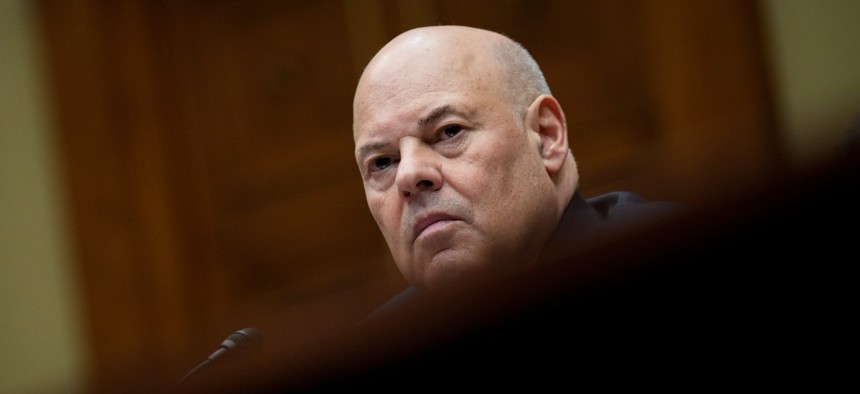
Postmaster General Louis DeJoy testifies during a House Oversight Subcommittee on Government Operations and Federal Workforce hearing in May. Drew Angerer / Getty Images
DeJoy's USPS overhaul plan might not be carried out well, watchdog finds
Postal Service management sharply critiques auditors' findings, saying GAO has a "fundamental misunderstanding" of the agency.
The U.S. Postal Service is taking many steps to ensure accountability and good performance as it implements a 10-year plan to transform its delivery network and operations, but a new report found it is creating unnecessary risks by thinking too much in the short term and not learning lessons as it goes.
USPS launched its Delivering for America strategic plan, spearheaded by Postmaster General Louis DeJoy, with 181 individual projects. That number was down to 126 earlier this year, the Government Accountability Office said, most of which are being carried out with a defined vision, significant oversight and with specific metrics to measure progress. When things have gone wrong, however, GAO found the Postal Service is making adjustments without a firm understanding of why or how to make improvements in the future.
Postal management mostly objected to the findings, saying GAO did not understand its work and was trying to force the agency to follow its narrowly defined rubric for project management.
The watchdog supported DeJoy’s efforts in a broad sense, noting the need for change at the mailing agency.
“Congress and USPS have taken significant actions in recent years to address USPS’s financial condition, including Congress’ passing of the Postal Service Reform Act of 2022,” the auditors said. “However, USPS’s business model is still not financially sustainable.”
USPS has made improvements to its service performance (in part by slowing down its delivery windows), generated $1.7 billion in additional revenue in fiscal 2023 by raising prices and convinced Congress to take much of its debt off its books. Still, GAO said, the agency is at risk of once again not meeting its goal to generate a net positive income in fiscal 2024 and maintains an unsustainable level of unfunded liabilities.
As USPS continues to implement DeJoy's vision, it is following an executive framework it has labeled its “Get it Right” strategy. Each individual project has associated with it estimated cost savings and revenue, milestones, established metrics and targets, identified and assessed risks, assigned executive sponsors and, when required, prepared documents for review by the Postal Regulatory Commission and the Postal Board of Governors. The agency has a project monitoring system in which project leads enter updates. That system is reviewed by the Office of Strategic Planning, the Get it Right steering committee and DeJoy himself.
GAO praised the Postal Service for creating plans with controls, defined scopes, cost estimates and a database to monitor efforts. Of its 11 strategies for agencies to follow when undertaking significant projects, however, the auditors said USPS was only sufficiently following six of them.
By only examining projects 12-18 months out, rather than the full lifecycle of the initiatives, GAO said USPS risked only examining incomplete information.
“This may contribute to unreliable completion dates, time extension requests, and delays,” the watchdog said.
When things do not go according to plan—due to delays, cost overruns or poor performance—USPS does not require project teams to conduct a root cause analysis. In most cases, project managers engaged in such reviews, though GAO noted the teams were at risk of failing to glean lessons learned. The Postal Service is exacerbating that risk by failing to document what oversight actions it takes to correct for performance or other issues.
“USPS does not have a formal system to identify or disseminate lessons learned, according to USPS officials,” GAO said.
Postal management said it discussed what went well and what could have been improved after each project ends, but the auditors found no evidence of those lessons being preserved or disseminated. GAO further faulted USPS for creating exceptions to its guidelines for specific projects without documenting why, which restricts future oversight. Flexibility is important, the watchdog said, but adjustments should be explained and reviewed.
“Having a system or guidance is important given how many projects USPS will be implementing under its strategic plan in coming years,” GAO said. “Lessons learned from implementing one project may benefit one or more other projects.”
Luke Grossman, USPS’ senior vice president for finance and strategy, took exception to GAO’s findings, saying the watchdog was being too narrow-minded in its assessments.
“We appreciated that GAO uses a specific set of leading practices for project management; however, GAO does not acknowledge that there are many valid ways to approach strategic planning and project management,” Grossman said.
He said GAO’s recommendations were largely too vague to implement and took particular issue with the finding that postal management was not considering the full lifecycle of its projects.
“This represents a fundamental misunderstanding of our strategic planning process, which does track the full lifecycle of each project,” Grossman said.
GAO again said it understands the Postal Service’s focus on flexibility, but said the agency should follow its advice to limit potential failures.
“While we recognize the value USPS places on its iterative planning process and flexible approach, we maintain that there are risks to this approach that USPS could address through clearer implementation policies,” the watchdog said.
USPS under DeJoy has at times had a testy relationship with his watchdogs, including Congress. The postmaster general has repeatedly asked postal overseers and stakeholders not to resist the changes he is implementing, suggesting any further delays would imperil necessary reforms. He asked the postal regulator not to further probe his network reform and consolidation plan, but the PRC rejected that request. It is ramping up the implementation of that effort in the coming months, though full implementation is expected to take several years. Postal management has said it will take the full 10-year window of its strategic plan to put in place all of the changes it has envisioned.







